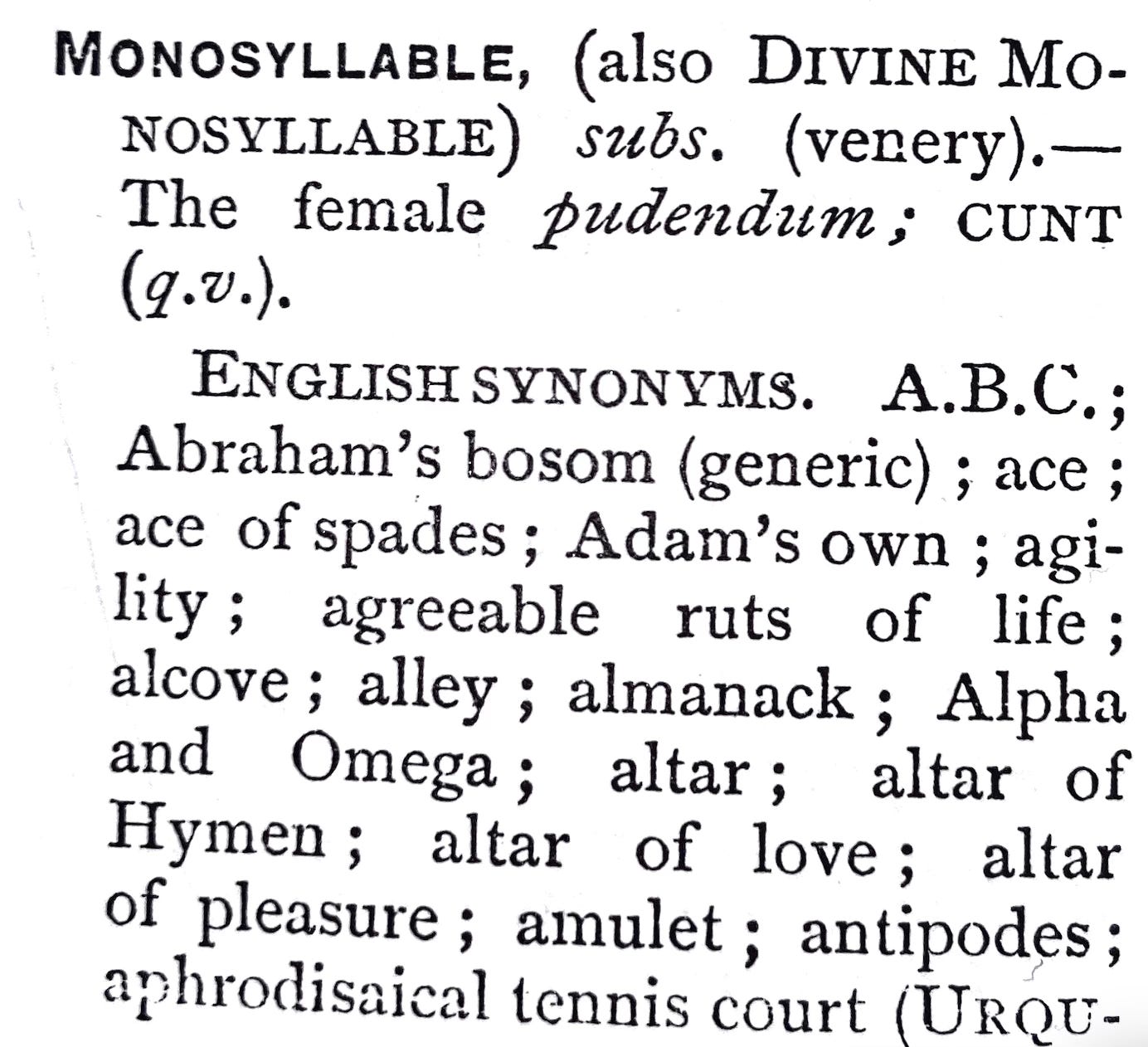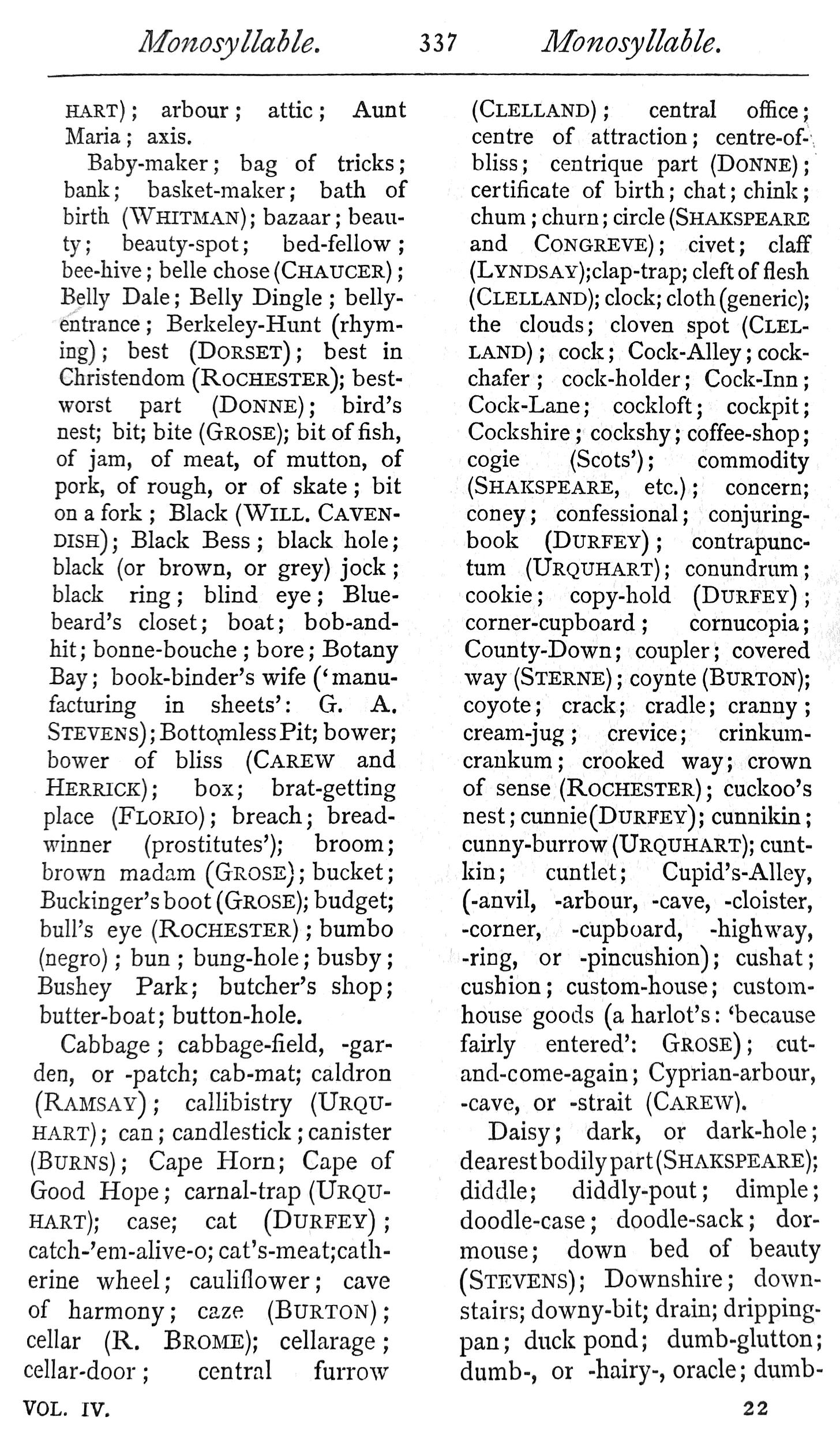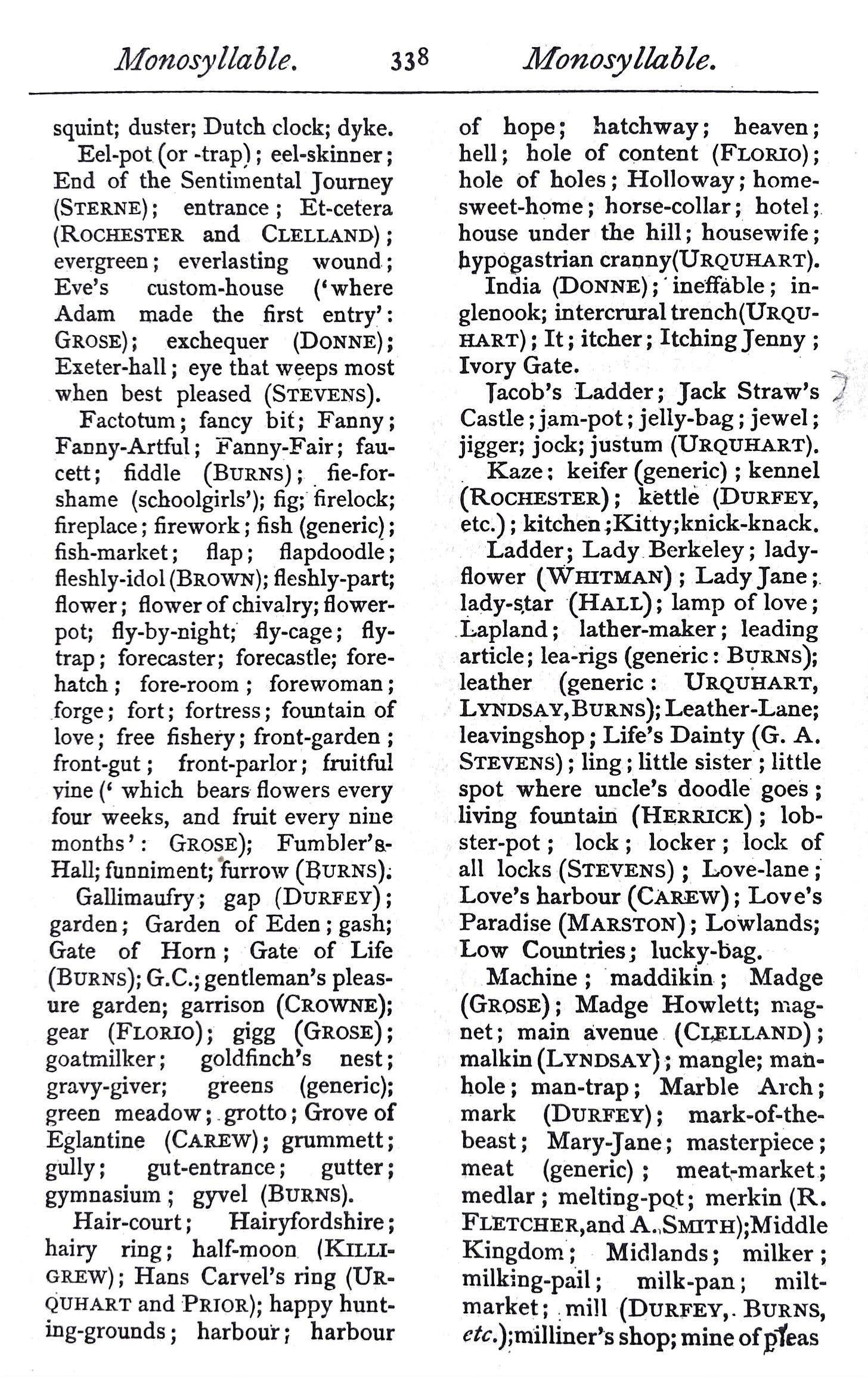A Bad Word With Many Synonyms
Saying it without saying it for centuries
This short post is about a Bad Word.
How bad is this Bad Word? That depends where you live in the English-speaking world.
In the United States and Canada, saying the Bad Word in almost any context is likely to provoke disgust and outrage. The Bad Word is a bad, bad word.
In the UK, the Bad Word is bad, certainly. One would never say it in polite company. But over a pint with friends, it’s often heard and almost never causes a fuss. And if you’re at a Ricky Gervais show, it is almost as common as words beginning with the letter “e.”
You can probably guess what the word is now.
I won’t write the word, please note. But I will quote others who did. These quotations are old and, thanks to the magic of time, that makes the Bad Word seem less bad. But it still may offend. So if you don’t want to see the Bad Word, stop here.
But if you do you will never learn archaic synonyms for the Bad Word. And some of those are glorious.
The oldest and most common of those archaic synonyms is …
Brace yourself.
…the oldest and most common of those archaic synonyms is “monosyllable.”
The Bad Word has only one syllable, of course. Thus, for centuries, writing “monosyllable” in certain contexts was enough to let the reader know which particular monosyllabic word the writer had in mind.
If this was too subtle, writers would add the linguistic equivalent of a wink: It is not merely a monosyllable. It is the “divine monosyllable.” Or “venerable monosyllable.”
The oldest known linkage between the Bad Word and “monosyllable” dates from 1680, although the statement itself shows that people had already been hard at work finding new and different ways to say the Bad Word without saying the Bad Word: “Whic word Cunt is very short and fit [...] methinks indeed they do ill, that make such a pather, to describe a Monosyllable by new words and longer ways.”
I got that from Green’s Dictionary of Slang, an amazing collection compiled by a clearly obsessed man named Jonathon Green over 17 years starting in 1993. When it was published in 2010, it was a three-volume set with almost 100,000 entries. It’s also online. But be warned: If you share my taste for etymology and useless information, that website is the La Brea Tar Pit of websites.
Mr. Green’s effort is just the latest chapter in the long history of obsessive men — it’s always men — compiling and annotating slang. This history is so extensive that in 2008, the Oxford University Press published A History of Slang and Cant Dictionaries. That’s right. It’s an entire history of obsessive men collecting vulgar words. And it’s a multi-volume series.
I recently got a copy of one volume in the seven-volume series Slang And Its Analogues, the 1891 magnum opus of J.S. Farmer and W.E. Henley. (A complete set of the original dictionary costs $1,000, so….) By happy coincidence my volume included the letter “m,” and thus the entry for “monosyllable.” For reasons known only to Farmer and Henley, the entry for the actual Bad Word is short, even terse, because they chose to collect all the synonyms for the Bad Word under “monosyllable.”
Which made the entry for monosyllable as long as it is mesmerizing.
Here is the opening:
I must admit I love “Alpha and Omega.” They are, of course, the first and last letters of the Greek alphabet. And in the Book of Revelation God calls himself the Alpha and the Omega, meaning he is the beginning and the end. So “Alpha and Omega” as a synonym for monosyllable? Clever. And so very blasphemous.
But “monosyllable” and the other 18 synonyms are merely the amuse-bouche.
Behold, the full majesty of the English language.
Many of these are crude or obvious or just the sort of thing (“flapdoodle”) to make 12-year-old boys snigger. Some are excellent in historical context. Sailors must have loved “Cape Horn.”
Others are intriguing and invite further investigation. Who is this “Hans Carvel” in “Hans Carvel’s ring?" Turns out it’s a reference to a bawdy early 18th-century poem about an old man with certain performance issues who marries a high-spirited young woman. And “Jacob’s Ladder?” Any regular reader of the Bible — which was most of the literate population in those centuries — knew that was a reference to the Book of Genesis and Jacob’s dream of a ladder ascending to heaven. Geddit?
But some are inscrutable. At least to me.
“Jack Straw’s Castle?” I vaguely recall that Jack Straw was one of the leaders of a medieval peasant rebellion. But what’s his “castle?” The combined powers of Google and Wikipedia revealed to me that there was once a renowned pub called “Jack Straw’s Castle.” Dickens drank there, apparently. (But who knows? Every time I check the history of an old English pub I read that Dickens drank there. When did the man work?) And Bram Stoker mentioned Jack Straw’s Castle in Dracula. But what has any of this to do with monosyllable? I have no idea.
You may be wondering how many synonyms we are up to now. I don’t know. Too many to count. At least I won’t. Feel free.
Which is impressive, isn’t it? Think of all the human ingenuity that went into the invention of new ways of saying something you aren’t supposed to say.
And yet, that’s not the complete list.
Farmer and Henley’s full entry goes on for three-and-a-half pages. And when they exhausted English, they added synonyms for the Bad Word in French, German, Spanish, Dutch, Portuguese, and Italian.
The complete entry in all languages is nine pages. Nine pages of synonyms for monosyllable, which is itself a euphemism for the Bad Word.
Ladies and gentlemen, the capacious human imagination. We are indeed a noble species.
POSTSCRIPT: A friend who is an English professor -- the sort who knows his Middle English and gets shirty when its called Old English -- wrote me with a gentle correction: There are earlier euphemisms than monosyllable.
"Off the top of my head, Chaucer uses 1) instrument, 2) quoniam (Latin for "something", but also vaguely punning) and 3) Belle Chose (French "pretty thing"). I'm sure there are more."
Indeed, calling monosyllable "the earliest" euphemism, when I only know it to be a very old euphemism, was inexcusably casual of me. Why, it was downright Trumpian. Mea culpa.






Whenever I see the airline name Aer Lingus I laugh.
This reminds me of the joke wherein a young lad cannot correctly remember his new school teahcer's name when asked by his father: "What is your new teacher's name?"
When the teacher told her students she said: "My name is MISS PRUSSY - as in PUSSY with an "R" ...